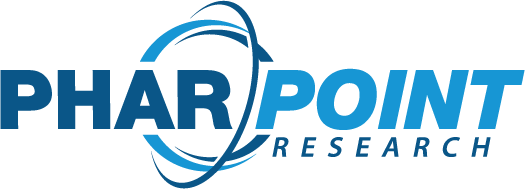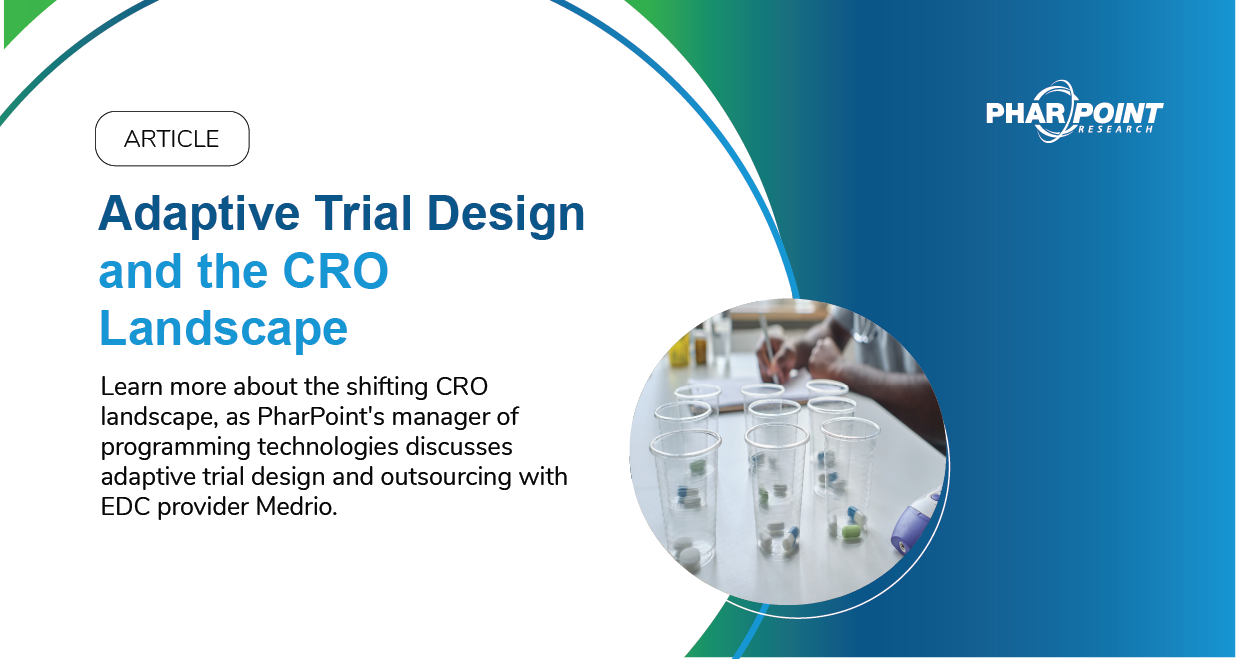Adaptive Trial Design and the Shifting CRO Landscape
This article was originally published on the Medrio blog on May 7, 2019, discussing outsourcing, adaptive trial design, and more. You can view the Medrio website here.
Anyone with more than a few years’ experience in the clinical research industry has been witness to major industry shifts, both in the way clinical trials are conducted and in market dynamics. Jim Nance, a longtime user of Medrio’s EDC software, has been in clinical research for over 15 years, and has had a front-row seat as his industry has undergone exciting transformations.
We sat down with Jim, who serves as Manager of Programming Technologies at the North Carolina-based contract research organization PharPoint Research, Inc., to discuss how his business has been affected by, and participated in, this change. Our conversation covered big topics like outsourcing, innovations such as adaptive trial designs, and more. Here’s a condensed version of the discussion.

Medrio: Thanks for taking the time today, Jim. Can you start by telling me a bit about PharPoint Research and your experience with Medrio?
Jim Nance: Certainly. PharPoint is a full-service CRO. Our services run the gamut from clinical operations to project management, data management, biostatistics, standardization, and warehousing. We’ve been around since 2007 – our three co-founders were colleagues at other companies and decided to go out on their own. Each had a lot of experience in the CRO and broader clinical research industry, and they wanted to start a company that really walked the walk when it comes to focusing on clients and client satisfaction. Like any other business, CROs have profit and growth motives. Our founders had a vision of customer success – of really focusing on the customer’s needs and fostering healthy relationships – as the best route to achieving that growth and being successful as a company.
When it came time to make the transition from paper-based data management to EDC, about 10 years ago, we were looking for an EDC system and a company based on solid technology we could grow with. Medrio seemed like the perfect solution. Both of our companies were and are very client-focused, and so it was clear Medrio was a great fit. I’ve been building and maintaining EDC studies in Medrio ever since.
M: The CRO market is growing, as pharma companies increasingly outsource their clinical operations rather than conduct their studies in house. What are your thoughts on the reasons for this trend? Has it had an impact on PharPoint?
JN: A moment ago, I mentioned the business motives of CROs. Well, pharma is also a business. To turn a profit, it needs specialized people with specialized skills. And what the industry is realizing is that it normally makes better business sense to partner with a specialized CRO rather than build and maintain that specialized skillset in-house, especially since the same company might run a multitude of different trials that require a multitude of different skills. So that’s really the driving force behind the outsourcing trend.
The interesting effect it has is that it grows the CRO marketplace, creating opportunity and competition, which then allows pharma companies the flexibility to choose who they feel is the best service provider for their particular study needs. They might run 10 studies that are all very different, and a healthy CRO market lets them pick the best CRO to serve each of those studies. The alternative – keeping their trials in-house and maintaining skillsets that can satisfy those varying needs – is tough and expensive to do. So the trend toward outsourcing is creating a healthy and robust CRO market, which in turn creates this opportunity and flexibility for sponsors. It’s this kind of symbiotic, mutually-beneficial relationship.
M: Let’s talk about adaptive clinical trial design, which is creating a lot of buzz in clinical research. PharPoint has experience with adaptive trial designs, and hosted a webinar with Medrio on best practices when conducting adaptive trials. What kinds of success have you seen with adaptive designs that you haven’t seen with traditional ones?
JN: It really boils down to the question of efficiency. Study sponsors are always thinking about efficiency, but they don’t always bring that to their study designs. They’ve known for a long time that they can use pre-planned, fixed-length studies, conduct them in sequence, use the time in between studies for key decision-making, and that the regulatory agencies are okay with that. This approach works, but it doesn’t make use of knowledge that may have been gained during the course of a study. They understood that an adaptive approach may be more efficient, but were reluctant to turn away from a traditional approach that they knew had the support of regulators. It’s a “better safe than sorry” calculation. They feared that if they took an adaptive approach and made changes mid-study, they’d risk scrutiny from regulatory agencies, which could put their whole study at risk. With clinical trials getting more and more expensive, that wasn’t something they’d feel comfortable with.
But regulatory agencies have now signaled that they understand this conflict and are willing to accept adaptive study designs. So, what we’re seeing is more adaptive protocols in which major study decision points are integrated into the design. Traditionally, even if researchers realized a change might be advantageous part-way through the study, they might choose not to act upon it. Instead, they’d bank that information and use it for the next study. With adaptive designs, those decisions don’t have to be pushed to the “next study.” All those mid-study insights can be incorporated into one or fewer studies.
What’s really exciting about this – and this is a big reason our clients have been pleased when we conduct studies with adaptive trial designs – is that it can result in fewer studies being necessary for regulatory submission, because you can accomplish in a single study what used to require multiple studies. People are out there asking “why are there drugs coming to market with only one or two studies behind them?” It seems strange, but it makes sense, because adaptive designs have enabled sponsors to more efficiently get the amount of data and information necessary for a regulatory submission using fewer studies than sponsors previously had to conduct.
M: I wonder, then, if the standard statistic around how long it takes to bring a new drug to market – something like 8 to 10 years – is going to trend downward. In other words, if the average time to market will decrease as adaptive designs become more prevalent.
JN: I would expect that to happen, yes. We may well start to see that in the near future.
M: What do you think is the biggest challenge facing pharmaceutical-focused CROs today? How has PharPoint navigated this challenge?
JN: It’s got to be competition. With so many CROs out there today, we have to effectively convey the advantages sponsors will have should they choose us for their studies. We feel two of the best gauges of a CRO’s quality are repeat business and unsolicited word-of-mouth business. If you do exemplary work at a competitive price and treat your clients with honesty and respect, they’ll keep coming back. They’ll also sing your praises if they end up working at a different company later in their careers. In this way, it all comes back to our founders’ original vision of delivering an all-around fulfilling client focused customer experience.
M: Jim, thanks so much for your time today.
JN: No problem, it was nice chatting!
ABOUT MEDRIO:
Founded in 2005, Medrio offers an integrated eClinical software platform with a fully hosted Electronic Data Capture (EDC) system. Medrio’s revolutionary SaaS technology drastically reduces study timelines and costs by giving study managers more control over their studies. By simplifying and streamlining the data collection process – without the need for any custom development – Medrio allows researchers to build their studies in days instead of months without any programming knowledge. Their diverse set of customers includes CROs and sponsors conducting studies across all study phases and therapeutic areas and ranges from newly formed startups to the top 5 biopharmaceutical companies.
Learn more.




